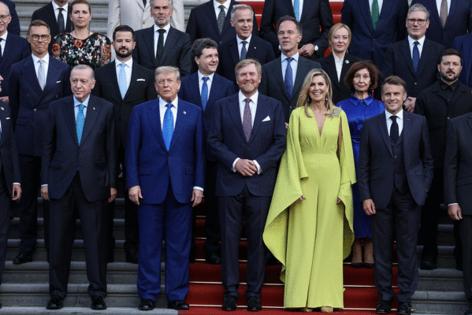NATO tries to use charm to keep Trump on its side
Published in News & Features
THE HAGUE, Netherlands — U.S. President Donald Trump ensured that NATO’s high-stakes summit would be a nervy affair to the end as he flew in to The Hague fueling doubts about whether the U.S. remains fully committed to defending its allies.
The U.S. president was feted as the guest of honor at a dinner hosted by King Willem-Alexander on Tuesday. NATO Secretary General Mark Rutte, who has led a monthslong charm offensive to keep the U.S. onside, went out of his way to underline Trump’s leadership of the Western alliance.
“Let me salute President Trump’s longstanding leadership in calling for NATO to increase defense spending,” Rutte told the assembled leaders. “NATO has already added an additional $1 trillion in defense spending over the past decade. Mr. President — dear Donald — that is thanks to you pushing us.”
By the end of Wednesday, when Trump is due to hold talks with his allies and then give a press conference at 3 p.m. local time, Rutte will have a sense of whether his plan has been successful.
The former Dutch prime minister has been fighting to stop the summit from spinning out of control after Trump told reporters aboard Air Force One that his commitment to Article 5, NATO’s crucial collective defense obligation, was open to interpretation.
“There’s numerous definitions of Article 5. You know that, right?” Trump said earlier on Tuesday. “But I’m committed to being their friends, you know, I’ve become friends with many of those leaders, and I’m committed to helping them.”
The flattery campaign spearheaded by Rutte had been discussed ahead of time by the European leaders desperate to keep Trump on board and avoid a more disruptive lurch downward in the transatlantic relationship, according to two senior officials.
Italy’s Giorgia Meloni, who has a well-established rapport with Trump, was seated next to the U.S. leader over dinner and they had a long discussion about the latest developments in the Middle East, according to an Italian official.
At the same time, the officials said, Rutte had been clear to European leaders that in order to win Trump’s respect they had to back up the flattery with a serious increase in spending. That had been central to Rutte’s strategy for months.
Rutte has geared the whole summit toward securing a renewed commitment from Trump to Article 5 and, to achieve that, he pushed member states to meet the president’s demand that they increase defense budgets to 5% of GDP. The two-day event was carefully choreographed to minimize the chance of anything annoying the U.S. leader.
But Spain’s Pedro Sanchez refused to play along, publicly declining to accept the target to the frustration of Trump, and perhaps Rutte too.
“Always a problem with Spain,” Trump said. “Spain’s not agreeing, which is very unfair to the rest of them, frankly.” He followed up with a Truth Social post highlighting Spain’s defense budget.
A Spanish official said that Sanchez is aware that he could come under fire from Trump on Wednesday and his team is braced for a difficult few hours, but they hope it won’t come to that.
On the sidelines of the main discussions about spending and collective defense, Europe’s leading military powers are still fighting to shore up Ukraine’s position more than three years after the Russian invasion. Trump’s focus has shifted since his unsuccessful push to secure a ceasefire early last month.
Ukrainian President Volodymyr Zelenskyy is attending the summit as a guest and is scheduled to hold a bilateral meeting with Trump on Wednesday.
Zelenskyy met with Emmanuel Macron on Tuesday and the French president told him that European leaders are trying to forge a new coalition to support Ukraine’s defense in its war against Russia. Other leaders too are likely to press Zelenskyy’s case in their private talks with Trump and one official suggested they might use the apparent success of his strikes on Iran to encourage the U.S. president to offer Kyiv more backing.
German Chancellor Friedrich Merz had earlier sought to argue that Europe is ready to step up and take responsibility for its security. He told lawmakers in Berlin that he’ll build Europe’s strongest conventional military in order to defend against the challenge from Russia.
“Because Russia, above all, actively and aggressively threatens the security and freedom of the entire Atlantic space,” Merz said. “We have to fear that Russia will expand its war beyond Ukraine.”
Rutte, though, was focused on flattery.
As Trump departed for the summit in The Hague, the NATO chief had sent him a fawning private message, lauding him for his achievements in halting the conflict between Israel and Iran and for securing an unprecedented increase in European defense spending. Trump screengrabbed the message and posted it on social media.
“You will achieve something NO American president in decades could get done,” Rutte said in the message, which was confirmed by NATO’s press office. “Europe is going to pay in a BIG way, as they should, and it will be your win.”
_____
With assistance from Michael Nienaber, Donato Paolo Mancini and Daniel Basteiro.
_____
©2025 Bloomberg L.P. Visit bloomberg.com. Distributed by Tribune Content Agency, LLC.







Comments